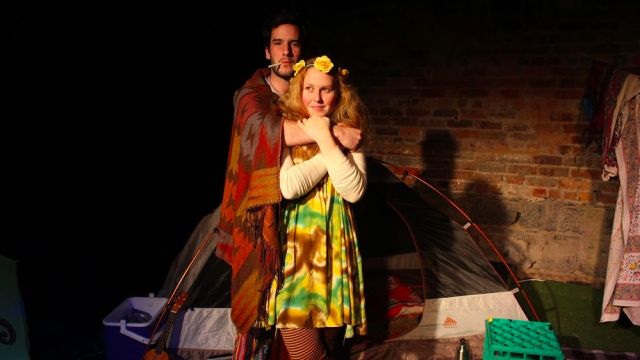Dead Heads
It’s the 1970s and Sadie (Sophia Simmons) and Ethan (Rian Howlett) are high school sweethearts. They’re passionate fans of The Grateful Dead. Sadie is a wide-ranging reader of literature and philosophy, but also – too bad for her – starry-eyed about Ethan. He’s the son of Holocaust survivors and just a little self-absorbed. He figures that all that peace and love stuff in the 60s failed, so now they should just live for themselves. What he really means is he’ll live for himself… Via a series of short scenes, Dead Heads tracks their relationship up into the 90s.
They are on the road with The Grateful Dead, their home appears to be a tent, a lot of pot is smoked, a lot of nonsense talked. They plan to go to India; they never do. Sadie writes fewer and fewer poems, but begins to want to settle down, have a child. That’s anathema to Ethan. And so on. There are references to various incidents that occur off stage – Ethan’s mother buys him a boat, their friend Pete dies, Ethan’s sister becomes Sadie’s friend and helper – but these things are both ‘too interesting’ for mere reference and have no real effect on the story anyway. What is the story?
There is such a thing as ‘emotional repetition’ – that is, new information may be adduced, but the emotions evoked are the same. Hence Dead Heads feels exasperating. Time passes, but essentially we get the same scene over and over: he’s childish, selfish, jealous and evasive and she goes right on loving him. You almost want to step on stage and shake her.
 A further problem with Dead Heads is that from the first scene – where she is a naïve bunny and he is the selfish prick he remains throughout – we figure this is never going to work. But then there’s a credibility problem because it keeps going for twenty years. What Sadie sees in Ethan is a mystery.
A further problem with Dead Heads is that from the first scene – where she is a naïve bunny and he is the selfish prick he remains throughout – we figure this is never going to work. But then there’s a credibility problem because it keeps going for twenty years. What Sadie sees in Ethan is a mystery.
The text more or less implies that sex may be what holds them together, but although we see frequent passionate kissing, there isn’t much visible chemistry between Ms Simmons and Mr Howlett. That’s not a criticism of them: why should there be chemistry between the two actors who happen to be playing these characters?
That’s a casting decision made by director Scotty Wings, who also puts non-speaking extras, so to speak, on stage, lying about the campsite set. Arielle Cottingham’s lighting eases the transitions and convincingly creates moods and times of day, while Jacky T’s sound design, which includes a lot of The Grateful Dead, of course, is subtle and effective. But the play remains the play.
The publicity material describes Dead Heads as ‘An ode to a dying generation and a dying relationship’. That’s rather overstating the case. In what sense is this generation dying? And the relationship takes far longer to die than it believably should. It’s heartbreaking to see these two young actors working so hard, so sincerely, giving it all they’ve got, in a play that is not really worthy of their efforts. I appreciate the problems of the Owl & Cat: they must find plays that are containable and achievable within their resources. Nevertheless, a better choice than Dead Heads could surely be made.
Michael Brindley
Subscribe to our E-Newsletter, buy our latest print edition or find a Performing Arts book at Book Nook.

